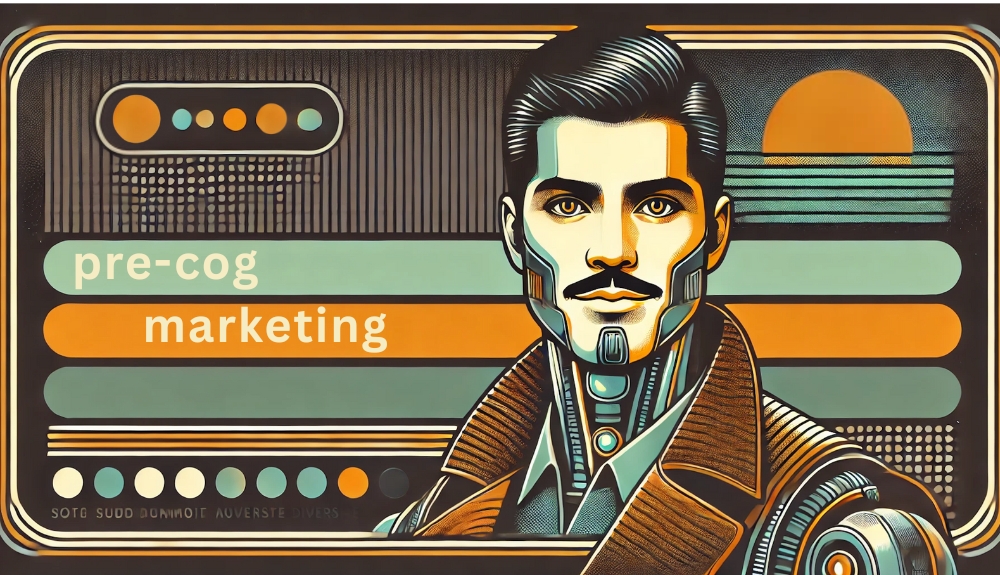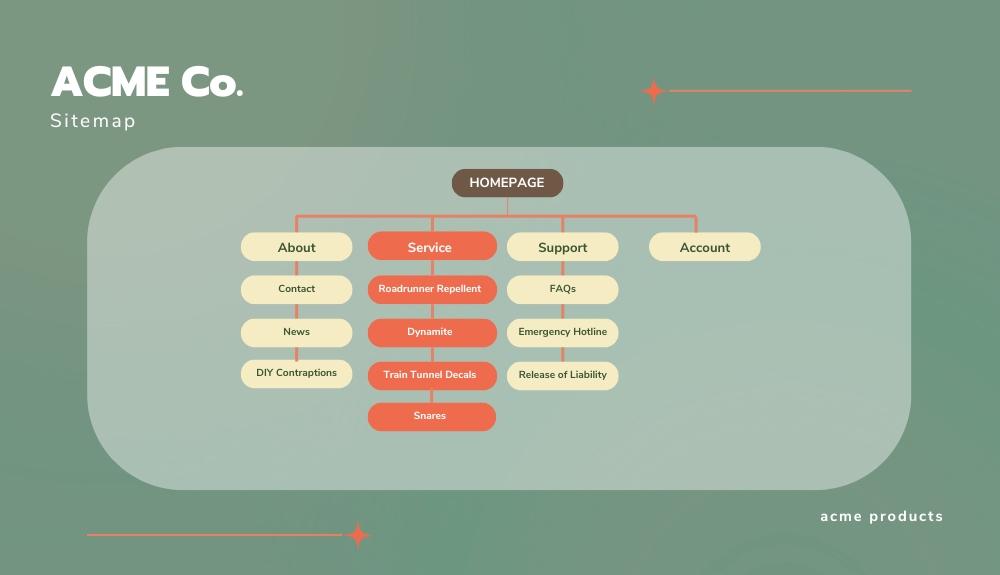
An Introduction to pre-cog marketing
Marketing, especially digital marketing, is getting harder in all sorts of ways due to AI, market changes, and increased gatekeeping by monopolies like Google and Meta. But all these changes also present some interesting opportunities if you know where to look.
The future of marketing
In Philip K. Dick’s “The Minority Report” (also a Tom Cruise movie), Dick imagines a future where criminals are arrested before they commit crimes. This is accomplished by humans plugged into machines (pre-cogs) who can see into the future by a few weeks and therefore tip-off the police before bad stuff goes down.
What if we, as marketers, could focus on people’s desires and solve their problems before they happen? Not when they type “gluten-free granola brands” or “moss removal service near me” into Google, but before they even think to do that.
What if we could somehow reach through space and time, and tap someone on the shoulder and say, “your roof has moss on it. You need some help with that?”
Data empowers predictive insights
Do you remember back in 2012 that Target made headlines for being able to tell when a shopper was pregnant before they knew themselves, simply based on their shopping habits?
A father famously stormed into a Target store, angry about pregnancy-related coupons sent to his teenage daughter—only to apologize later when he discovered she actually was pregnant.
We’re getting better and better at predicting behaviors. Netflix, for example, analyzes viewing patterns to predict what shows you’ll enjoy, often more accurately than you could predict yourself.
Amazon’s recommendation engine famously drives 35% of their revenue by suggesting products you didn’t know you wanted.
AI can “notice” things
LLMs like ChatGPT are less like search engines and more like conversational suggestion engines. They can even intuit a users needs and suggest products and services before a user knows they need them.
In the same way that you might tell a friend that they should take a rest because they “look” tired, an LLM can gather data, and make recommendations through observations.
I’ve experienced this myself in chats with Claude or ChatGPT, but I think that it’s going to become more and more common. LLMs can also “see” and “hear,” which opens up additional recommendation possibilities.
If you use ChatGPTs camera mode and point it at your roof covered in moss, it might just give you a recommendation for moss removal (I have not tried this by the way, Just using it for illustration purposes).
Here’s a few hypotheticals of how AI might recommend your product or service in the pre-cog stage:
A user asks ChatGPT for antacid brand to help with their stomach pain and the LLM inquires about the users diet, asks about their coffee brand, and suggests 3 alternative coffee brands that are less acidic (and one of those coffee brands is yours).
While using Claude to discover great places to visit in Iceland for an upcoming trip, Claude asks the if user would they would like a list of things to pack for the trip. One of these recommendations is a rain-proof backpack cover that you just happen to sell.
A user asking DeepSeek about how to potty train their new puppy gets proactive suggestions about training resources as well as a list of pet insurance options, which includes your pet-insurance business.
The typical buyers funnel
The typical buyers funnel hasn’t changed that much in 127 years.
AIDA was coined in 1898 and stands for:
Awareness, Interest, Decision, Action
But you don’t see too many buyer funnels that include a stage that occurs before “Awareness.” That’s likely to change.
In psychology, they refer to the stage of pre-intent with the term “pre-contemplation.” It’s the state-of-mind that occurs prior to knowing. But I’m a sci-fi fan so I gotta stick with “pre-cog stage.”
(Granted, anticipating someones needs is likely easier than predicting future crimes.)
But how do businesses optimize for what people DON’T type into a search engine like Google? How do we ensure that AI Chat Bots mention our business when it matters most?
How to be a pre-cog marketer
We may not have direct access to the hordes of data that tech giants like Facebook, Google, and Netflix capture, but we do have access to lots of studies and research, AI tools, and most importantly, our fellow humans.
Our clients and customers are great sources of information and we can ask them about their experiences prior to making a buying decision.
Armed with this pre-cog data, we can publish content and have conversations online that give LLMs unique contextual data, data that could be used to help users find your products or services prior to the awareness stage of the buyers journey.
Building a pre-cog marketing strategy
To capitalize on this shift towards predictive recommendations, make sure to revisit your foundational brand elements and positioning, talk to your customers/clients, and create a pre-cog content plan.
- Make sure your values are unique and woven throughout your branding and marketing. (stress test: Are your values generic words like “Trust, Sustainability, Integrity, & Authenticity? If so, it’s time to get more specific.)
- Get serious about positioning. What are your verticals and horizontals. Who are your ideal customers? What are your unique offers? What are three unique things about every service and product you offer?
- Map the pre-contemplation triggers in your customer journey—what happens before they know they need you?
- Map out the areas on your website and other online spaces where you can publish deeper content about what you do, how you do it, and why it’s valuable.
- Do competitor research from a pre-cog perspective. What do context-based problem/solution stories are your competitors telling. What stories aren’t being told?
- Create a content plan. How many articles, new service pages, content hubs, customer interviews, testimonials, etc. can you publish in a month, quarter, or year?
Pre-cog marketing tactics
One way to frame pre-cog marketing activities is to think of LLMs as sales people. What information does ChatGPT need to be a good sales person for your services or products? What in-depth training materials would you provide a super-salesperson for your business?
Make sure that you publish this information on your website and distribute it across various websites and platforms to ensure that it is readily available to LLMs.
But this is not a one-and-done activity. This is the future of content marketing. This is a practice that needs to be planned, refined, updated, and developed over time.
This is hardly comprehensive, but here are a few emerging strategies that may help:
- Create narrative-rich content that demonstrates how your products and services could be super useful in unique situations. This gives LLMs a ready recommendation if a similar scenario arises.
- Develop a specialized business glossary that covers what you do, your approaches, important terms, policies, and more, a resource for that AI models can reference when discussing your field.
- Build “conversational reputation” by engaging with your customers on crawl-able sites like Reddit and Quora. Ask your customers how they discovered your products/services and how they came to choose you over others.
- Craft detailed comparative analyses of your products/services and how they differ from your competitors, so LLMs can reference this info when users ask about options in your category.
- Create decision trees and scenario-based content that reveals how your products/services help people in various contexts.
Where we are headed
There’s still a whole lot we don’t know about where we’re headed, and and to tell you truth, I’m worried about small businesses. Google. Meta, Amazon, and other monopolies are co-opting more and more of the playing field. The rise of AI gatekeepers, and AI advertising, could potentially create yet another layer of intermediaries between businesses and their customers.
However, I think that by being proactive, building community, sharing strategies, and by staying informed, we can be of some influence in how our world is evolving. We need to remain visible, relevant, formidable (and we need to champion and protect small business).
As Sci-Fi as it sounds, pre-cog marketing involves a return to human-centered thinking and this is something small businesses excel at.
Together we can build on some of our best human qualities like empathy and intuition and extend them with these new and powerful technologies.
Want to discuss more? Join me in the Gen Engine Slack Group
Free consultationconversationcoffeejokespep talkreality checkdeep breathhigh-fiveconfidence boostperspectiveah-ha moment
- Brand strategy & positioning
- Marketing strategy development
- SEO & Gen Engine Optimization (ChatGPT, Perplexity, Google AI Overviews)
- AI-powered tech stack optimization
- And more


